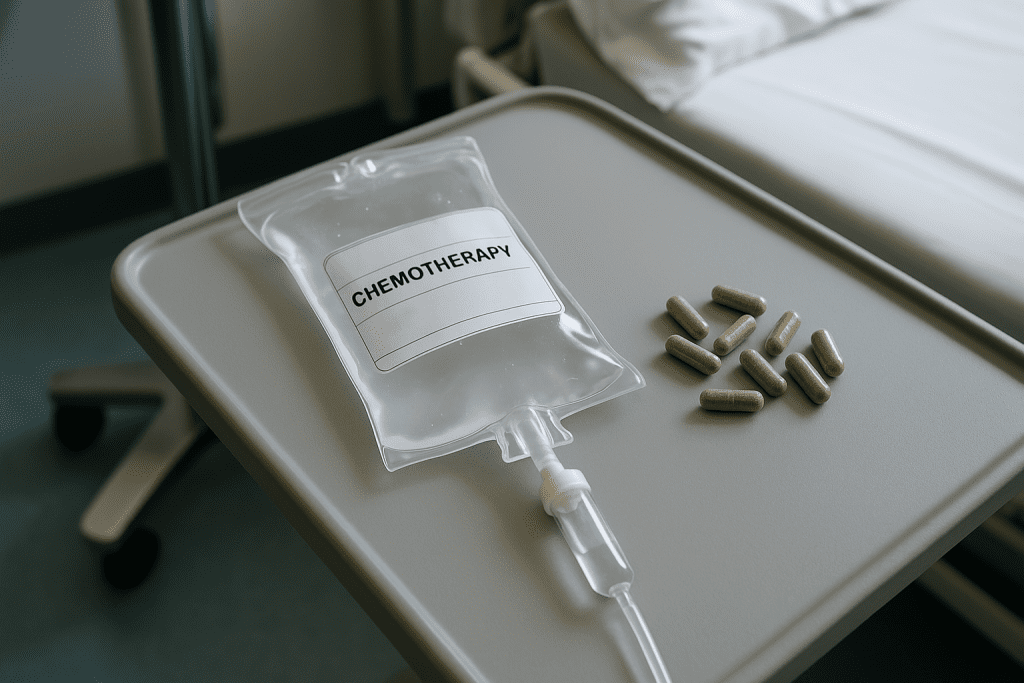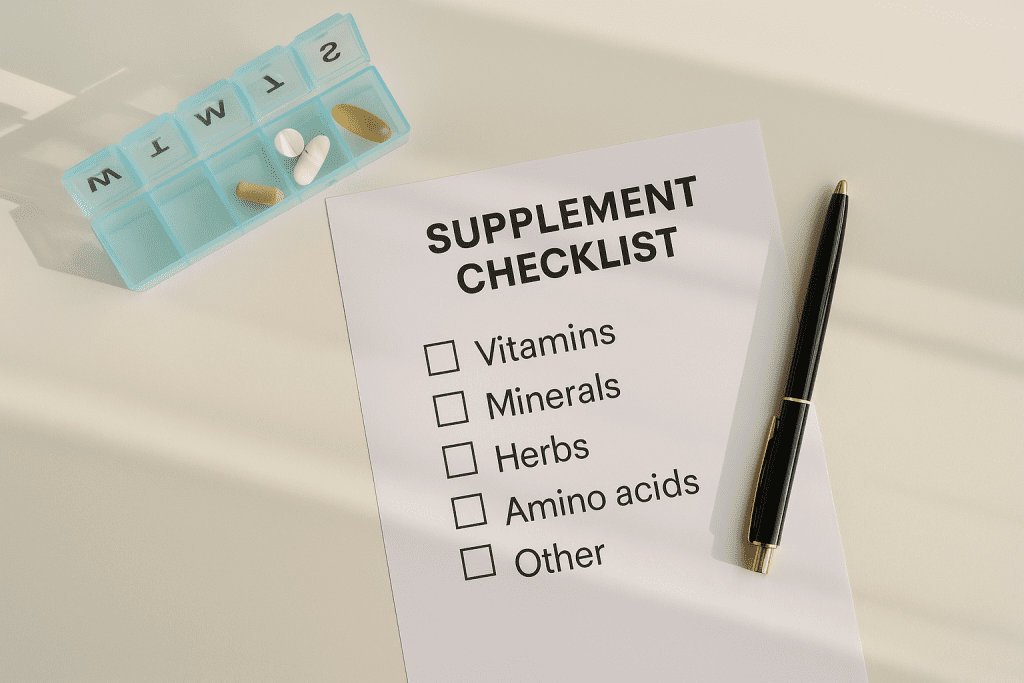Can supplements interfere with cancer treatment? Yes – and it happens more often than you might think. This article offers a science-backed guide to using a cancer supplement interaction checker, identifying potential chemotherapy herbal conflicts, and understanding onco-supplement safety.
From antioxidants and adaptogens to common vitamins, even “natural” products can disrupt how cancer drugs work.
We’ll walk through the top tools oncologists use, the most concerning interactions, and how patients and care teams can take a safer, more informed approach.
Summary / Quick Answer
If you’re undergoing cancer treatment, it’s essential to check supplement safety first.
Use these best practices to reduce risk:
- Use a trusted cancer supplement interaction checker, such as Memorial Sloan Kettering’s About Herbs, KNOWintegrativeoncology.org, or Natural Medicines Database
- Avoid known risky supplements, including St. John’s wort, green tea extract, high-dose vitamin E, and grapefruit
- Talk to your care team about all herbs, vitamins, and dietary supplements
- Discontinue certain supplements during chemotherapy, radiation, or immunotherapy
- Consult an integrative oncology or clinical pharmacist when possible
For an in-depth look at how to safely navigate supplements during cancer care, read on.
Why Supplements and Cancer Therapy Don’t Always Mix
Many people turn to supplements during cancer treatment, hoping to reduce side effects, boost immunity, or support energy. But even natural products can interfere with how cancer drugs are absorbed, metabolized, or cleared from the body.

Common Cancer Treatments Affected by Supplements
- Chemotherapy: Drug levels can be raised or lowered by supplements that alter liver enzyme activity
- Radiation therapy: Antioxidants may protect cancer cells from radiation-induced oxidative stress
- Immunotherapy: Certain immune-modulating supplements can reduce treatment effectiveness
For instance, green tea extracts can reduce absorption of drugs like erlotinib, while St. John’s wort can increase liver enzyme activity, making chemotherapy less effective.
Our related article on the “rash from vitamin C and chemotherapy drugs” explores these issues in more detail.
Best Tools: How to Check Supplement Interactions with Cancer Drugs
Modern oncology practice now includes digital tools to flag potential supplement-drug interactions in seconds.
Trusted Resources for Onco-Supplement Safety
| Tool | Strengths |
|---|---|
| Natural Medicines Database | Clinician-grade interaction reports and risk ratings |
| KNOWintegrativeoncology.org | Evidence summaries for over 200 natural products in cancer care |
| Memorial Sloan Kettering “About Herbs” | Free and patient-friendly, focused on cancer safety |
| Herbal interaction checker with chemotherapy drugs | Tailored for patients using herbal products alongside chemo |
These databases compile clinical studies, case reports, and expert consensus so you can cross-check your current supplements before and during treatment.
Which Supplements Raise the Most Red Flags?
Certain supplements have been repeatedly shown to interfere with cancer therapies – some by increasing drug toxicity, others by blunting effectiveness.
Noteworthy Risks
- St. John’s wort – Activates liver enzymes (CYP3A4), lowering blood levels of drugs like imatinib
- Green tea (EGCG) – Blocks absorption of certain oral chemotherapies like sunitinib and lapatinib
- Grapefruit – Raises plasma levels of some drugs, yet lowers others (like etoposide)
- Vitamin E (high dose) – May increase all-cause mortality when taken during radiation therapy
- Probiotics and cannabis – May conflict with immune-based therapies like checkpoint inhibitors
For more on turmeric specifically, see “turmeric supplements and chemotherapy efficacy”.
How Oncologists Are Managing Supplement Conflicts
Despite high supplement use among patients, fewer than half of oncologists routinely ask about it, often due to time pressure, lack of training, or limited access to interaction tools.
Current Practices
- Only 41% of patients report being asked about supplements
- Two-thirds of oncologists say they lack the training to offer guidance
- Most rely on outside databases, like Natural Medicines or UpToDate
This communication gap puts patients at risk, especially when they assume that natural means safe. That’s why some cancer centers are now embedding supplement screeners into electronic health records and training pharmacists or dietitians to help fill the gap.
Building a Safer Supplement Plan: What Experts Recommend

Effective onco-supplement safety requires a team approach. Here’s how integrative oncology clinics are improving safety:
Recommended Practices
- Document every supplement during intake and update regularly
- Use structured tools to assess risk of drug-supplement interactions
- Refer to experts – clinical pharmacists, dietitians, or integrative oncologists
- Set clear stop rules – discontinue supplements with known risks or excessive dosages
- Time administration carefully – some supplements may be safer between treatment cycles
In a large clinic review, 35% of patients were advised to stop at least one supplement, most often antioxidants or immune stimulants used during active treatment.
What’s Next: Training, Tools, and Research
To fully address the issue, cancer care systems are investing in several key areas:
- Better provider education – formal training on supplements in medical school and residency
- Improved screening tools – built into EHRs and updated in real-time
- Expanded clinical research – focused on confirming real-world effects of supplements on drug efficacy or toxicity
Until then, a conservative, evidence-based approach remains best. Every supplement should be treated like a potential medication – reviewed, screened, and monitored.
Conclusion
Supplements and cancer treatment can coexist, but only with informed oversight. Many natural products interact with chemotherapy, radiation, or immunotherapy in ways that can reduce effectiveness or increase harm.
Using a cancer supplement interaction checker is an essential step. Resources like KNOWintegrativeoncology and the Natural Medicines Database give clinicians and patients a foundation for making safer decisions.
Clinicians should initiate conversations, update supplement lists frequently, and consult specialized resources. Patients should feel empowered to ask about what’s safe – and when.
For more information, see our related guide on the “rash from vitamin C and chemotherapy drugs”.

